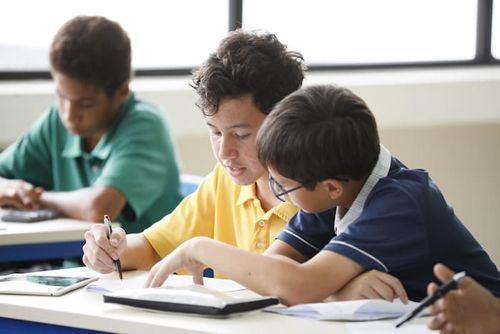At OWIS, we offer the Cambridge IGCSE programme for our Secondary students in Grades 9 and 10. This globally-recognised programme is designed to instil knowledge in students while simultaneously encouraging them to seek a deeper understanding of the presented information. We have found that the Cambridge IGCSE is the perfect complement to the academic rigour of the IB DP, which is followed for Secondary students in Grades 11 and 12.
In order to monitor student progress, teachers offer internal assessments for the IGCSE throughout the school year. This programme also relies on external assessments, which take place when students are finishing Grade 10. The external assessments are designed to evaluate the knowledge a student acquires as well as the skills they developed in the programme. These assessments consist of a variety of elements, including oral, written and practical assessments.
Our experienced teachers ensure that every day in the Cambridge IGCSE classroom is an engaging one, full of discussion and discoveries. This kind of dedication and passion exhibited by our educators in all grades at our campuses make us a leading international school in Singapore.
In the lead-up to the Cambridge IGCSE examinations, their focussed attention turns to helping students strengthen their concepts, as well as their confidence and resilience to endure the pressure of the assessment process.

We spoke to some of our Cambridge IGCSE teachers to garner tips for students for their preparation as well as advice for parents to support their children at home during examination time.
Alvin Chiang, Humanities Teacher and Grade 8 Tutor, believes that the IGCSE examinations are a marathon, not a sprint.

“Make every lesson and assignment count. Your teachers have thought about the best strategy for you to understand the content and they help you to apply the skills and knowledge needed to do well. So, it would be optimal for you to put your best foot forward for every class. The effort is cumulative, much like training for a marathon. A last minute burst of effort near the exam period will only add to stress and anxiety.
Parents can help by supervising their children at home in terms of keeping them on track to complete assignments, finish their readings and meet deadlines. Checks like these will keep students focused and realise that being consistent and diligent will be great investments for the long term.”
A diligent routine for revision, a conducive study environment and adequate rest are important for optimal IGCSE exam preparation, according to Angelo Govender, Maths/ICT/Computer Science Teacher and Head of the Computer Studies Department. He has further valuable tips to share for students and parents.

“Set realistic targets for different subjects. Some subjects may be theoretical, while others are practical, in the case of ICT, or application based, such as Mathematics. In ICT, for example, you will need to be confident with the practical use of applications. The mastery of this only comes about with constant practice. I also find that a good way to revise is to complete past examination papers.
For parents, I would suggest that you can help your child develop habits of study – a schedule typically works well and you can add this to their calendars. Then ensure that they maintain this schedule in order to create a routine. They are going to lose focus and become distracted so keep your child motivated. Ensure that there is a balance in your child’s life so they relax, destress and have fun also.”
Lakshmi Ganapathy, Physics Teacher and Grade 10 Tutor, emphasises the importance of practising past IGCSE examination papers.

“Check your understanding and self-reflect from taking mini-tests and practising past year papers. The absolute best way to ensure a high grade is to understand how the IGCSE mark scheme works so that you can adapt that to your response and get full credit in the examination. Make sure you balance between studying the content and practising past year papers. Get on board with your peers to come up with tips, tricks and techniques to remember and recall the concepts.
For most parents, Cambridge IGCSE is going to be the first international qualification for your child in their academic life. Your support for them at home in their learning journey is crucial. Motivate them to develop a growth mindset by encouraging them to consider their mistakes as opportunities to learn. Talk to them about their preparations and acknowledge their feelings. Always remember to celebrate their small achievements.”
Chang Liu, Head of Mandarin Department, offers specific advice for students who are appearing for the IGCSE Mandarin examination, which has different components.

“The IGCSE Mandarin as Foreign Language (0547) consists of 4 parts – Listening, Speaking, Reading Comprehension, and Writing. Once students have finished learning about all the topics, we advise the students to focus on the exams, not on the specific topics covered by the curriculum. If the students want to revise a topic before the exam, we recommend that they read the list of topics and, in some cases, the minimal core vocabulary to better understand the areas that need to be revised. To learn / verify important vocabulary and sentence structure, visit Quizlet or simply use the given learning materials with vocabulary lists, sample dialogues, essential questions, and sample writing templates.
Parents could help the students to go over the vocabulary and essential questions. They could check if their child could write each word in characters (not in Pinyin), and if they could write down the answers of the essential questions in complete sentences.”
We hope these tips are useful for IGCSE students and we wish everyone success in their examinations.
If you would like to know more about OWIS’ Cambridge IGCSE curriculum and approach and what makes us stand out as good international school for Secondary grades in Singapore, please join our virtual tour or contact the admissions team today.














